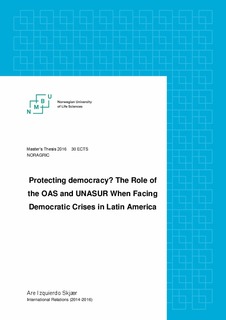| dc.description.abstract | Being a region that has undergone numerous dictatorships and authoritarian regimes throughout history, Latin America has over the past two decades enjoyed significant democratic stability. Despite this, the challenges to democracy in the region have not vanished, and a number of countries have experienced democratic crises over the past decade. Many of the international organizations in the region have engaged in these crises as they have democracy protection as part of their political agendas. Democracy was consensually defined as representative in type, and the Organization of American States (OAS) the designated organization to protect it at the turn of the millennium. As of 2016, this consensus is challenged by the emergence an alternative understanding of democracy as participatory in type, and Unión de Naciones Suramericanas (UNASUR) as an alternative organization for democracy protection. The thesis addresses the roles played by these organizations in five empirical cases of democratic crises: Bolivia, 2008; Honduras, 2009; Ecuador, 2010; Paraguay, 2012, and Venezuela at present.
The thesis is a qualitative case study research exercise in which the cases are the organizations, and the primary sources of data is relevant literature and interviews conducted with relevant actors. The thesis presents two hypotheses that serve as guides throughout. The first states that the divergent understandings of democracy in the region affect the role pf the organizations in the crises, and the second claims that state interests hamper the “actorness” of the organizations. The thesis employs Peripheral Realism as the theory with which it aims to answer the research question and address the hypotheses. The thesis argues that the theory is better equipped to explain political motivations and normativity in Latin America and the thesis involves a critique of Liberal Institutionalism, a common theory used to advocate for international organizations and their importance in global politics.
The thesis argues that UNASUR is a counterhegemonic organization that by virtue of defining democracy generically is normatively and ideologically more suitable to engage in democratic crises than the OAS. The values underpinning participatory democracy is a real alternative in the region, rendering the applicability of the IADC questionable. The thesis argues that organizations do not have “actorness” as they share the same weakness of having their decision-making process susceptible to national interests and concerns of sovereignty by member states. Both organizations settle with elections as the benchmark of reinstatement of democracy, but eroding democratic governance in-between elections is unaddressed. Theoretically, the thesis claims that the universality of Liberal Institutionalism is false. | nb_NO |
